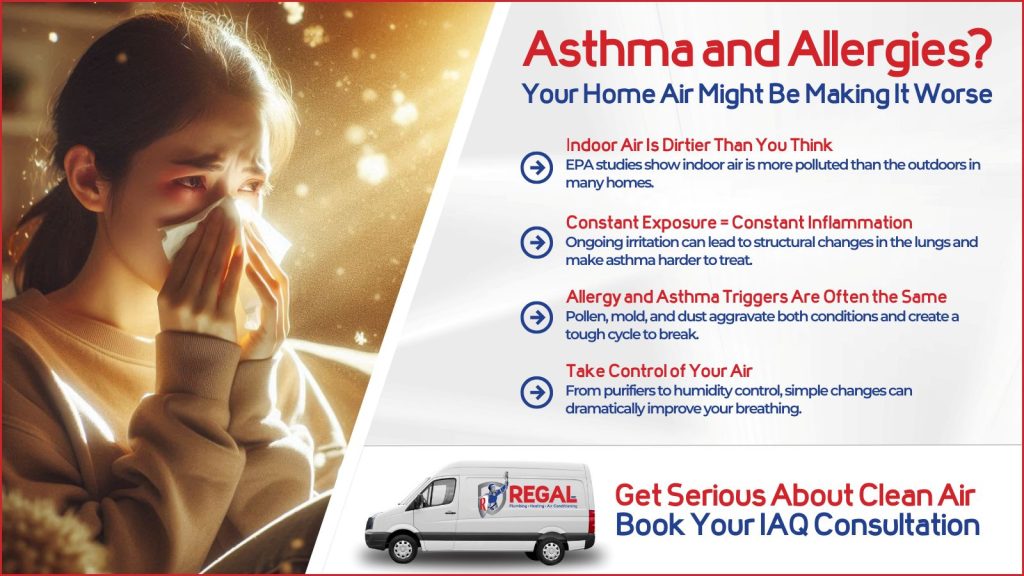If you or someone in your family suffers from asthma or allergies, poor indoor air quality (IAQ) isn’t just an annoyance—it’s a serious health risk. While we often worry about outdoor air pollution, the truth is that the air inside your home could be even more hazardous.
According to the EPA, indoor air can be up to five times more polluted than the air outside. And for individuals with asthma or allergies, that level of pollution can be life-altering. Keep reading to learn more about the importance of boosting your indoor air quality for your health.

The Link Between Indoor Air and Respiratory Health
Studies have shown that poor IAQ is directly linked to the development and worsening of both asthma and allergy symptoms. According to the Asthma and Allergy Foundation of America (AAFA), more than 25 million Americans have asthma, and over 50 million suffer from allergies.
Alarmingly, many of the most common indoor air pollutants are also key asthma triggers—dust mites, pet dander, mold spores, pollen, and chemical irritants from household cleaners and building materials. Scientific research indicates that early childhood exposure to indoor air pollutants—like secondhand smoke, mold, dust mites, and pet dander—can significantly increase the risk of developing asthma.
The Impact of Poor IAQ on Asthma
Poor indoor air quality doesn’t just make asthma worse—it can make it harder to treat. Here’s how:
Increased Frequency and Severity of Attacks
Ongoing exposure to indoor triggers can lead to more frequent and severe asthma attacks. These attacks not only require more use of rescue inhalers—which can cause scar tissue to form in the lungs with overuse—but also increase the need for medical visits and, in severe cases, hospitalizations.
Persistent Airway Inflammation and Remodeling
Chronic irritation from pollutants causes the airways to remain inflamed, and over time, structural changes (called airway remodeling) can occur. This means reduced lung capacity and a long-term decline in respiratory function, making asthma more difficult to control.
Allergies and Asthma: A Dangerous Duo
Allergies and asthma often go hand in hand. Many of the same triggers—pollen, mold, pet dander, and dust—cause allergic reactions and provoke asthma symptoms. In homes with poor air quality, this combination creates a vicious cycle where one condition worsens the other. Long-term exposure to allergens doesn’t just aggravate symptoms—it makes both conditions harder to manage and more disruptive to everyday life.
Protecting Your Family with Better IAQ
Fortunately, there are proven ways to improve indoor air quality and reduce your risk:
- Proper ventilation helps cycle out stale air and bring in fresh outdoor air.
- Air filtration systems like whole-house air purifiers can capture allergens and airborne irritants.
- Air sealing and insulation prevent pollutants from entering through cracks and gaps.
- Humidity control through humidifiers or dehumidifiers can minimize mold growth and dust mite populations.
HVAC maintenance keeps your system clean and functioning efficiently, reducing the spread of indoor pollutants. The long-term consequences of poor indoor air quality—especially for those with asthma and allergies—are serious.
Contact Regal Plumbing, Heating and A/C to schedule an appointment for indoor air quality services in Red Lion, PA. Committed to Service, Committed to You, Since 1974.

